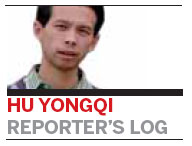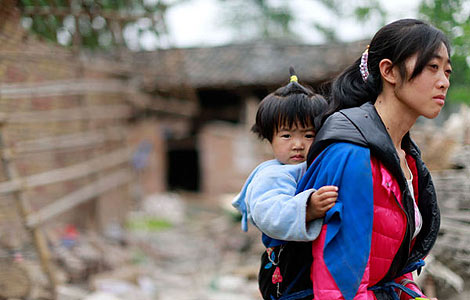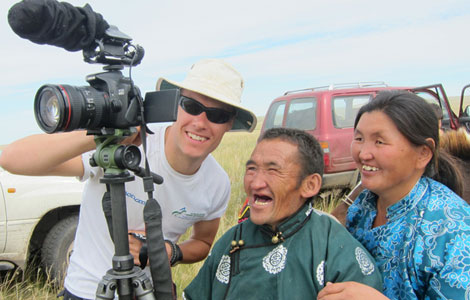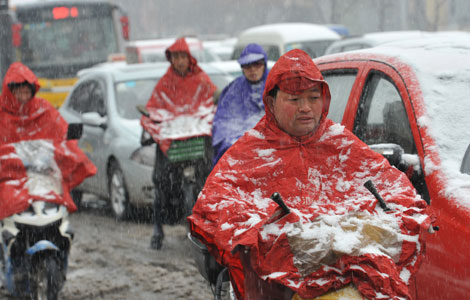Journey to the epicenter slowed by obstacles along road
Updated: 2013-04-22 07:22
By Hu Yongqi (China Daily)
|
||||||||

From the moment I set off for Lushan county, Ya'an, Sichuan province, all I could think of for the next 12 hours was how to get to the epicenter as soon as possible to let the outside world know about their situation, because I was only about 200 km away, closer to the scene than any of my colleagues.
I was in Dujiangyan, northeast of Lushan, for an pre-arranged interview on Saturday. While I was in the bathroom at about 8 am that morning, the house suddenly started to shake fiercely. I realized it was an earthquake and rushed out to the balcony. The shaking lasted for a few seconds and stopped.
News reports calling a magnitude-5.9 earthquake soon came out, and I set off for the interview as planned. At about 9 am, the magnitude was corrected to 7, and the death toll reached 29, with about another 100-some injured. So I started heading to Lushan, the epicenter.
My colleague managed to persuade people from the Sichuan Road and Bridge Co to take us to the county - the roads had been blocked to all but authorized vehicles - but we had to meet them at a Chengdu suburb. The 60-km trip took almost two hours.
The company's SUV took us to Ya'an, 40 km southeast of Lushan, at about 1 pm. By then I thought I could be relieved after a whole morning on the run, thinking that the photographer and I would reach the epicenter in no more than an hour.
But we soon learned the main road to Lushan was blocked by a fallen stone that weighed about 100 metric tons. So we had to take a circuitous route, 150 km longer than the closer one. This road was so packed with cars that we were forced to carve out another way parallel to the country road. A vehicle convoy soon formed behind us.
After about 30 km, we were blocked again by traffic control. Only military and construction vehicles were allowed to proceed.
After showing our credentials, an officer in a military sport utility vehicle agreed to give us a ride. By about 5:40 pm, we reached Lushan.
We set out again after a brief introduction with people at a shelter outside a hospital, knowing that the townships Longmen and Taiping were the two most severely damaged areas. As we marched on, the sky was getting darker. We saw all sizer of rocks piled up along the road by military bulldozers, the largest boulder being about 6 meters in diameter.
We saw people whose houses had been destroyed but who were not severely injured. They retrieved quilts from their fallen houses and made wide beds suitable for up to 20 people under roofs made of plastic held up by bamboo poles. We saw at least seven of such beds.
About 8:30 pm, we arrived at Longmen, 17 km northeast of the Lushan county center. It was 12 hours after breakfast, and we felt no hunger.
The headquarters had just been set up with two tents, but a media center had already formed.
Villagers used coal stoves and small lumps of coal - that and the quilts and a little rice were pretty much all they had taken from demolished houses - to boil water for about 60 soldiers so they could make instant noodles. I reminded them that the coal would soon be used up, and was told by a woman in her 40s that they "cannot stand watching those who were here to help eat dry instant noodles".
Contact the writer at huyongqi@chinadaily.com.cn
(China Daily 04/22/2013 page2)

 Obama celebrates young inventors at science fair
Obama celebrates young inventors at science fair
 Earth Day marked around the world
Earth Day marked around the world
 Volunteer team helping students find sense of normalcy
Volunteer team helping students find sense of normalcy
 Ethnic groups quick to join rescue efforts
Ethnic groups quick to join rescue efforts
 Earthquake leaves family shattered
Earthquake leaves family shattered
 Boston Marathon bombing suspect charged
Boston Marathon bombing suspect charged
 Chasing vestiges of the Great Wall
Chasing vestiges of the Great Wall
 Weekly Photos: April 15-21
Weekly Photos: April 15-21
Most Viewed
Editor's Picks

|

|

|

|

|

|
Today's Top News
Russia criticizes US reports on human rights
China 'aims to share its dream with world'
Chinese president appoints 5 new ambassadors
Nation's IPR suits see spike in 2012
H7N9 not spread between humans: WHO
Health new priority for quake zone
Sino-US shared interests emphasized
China, ROK criticize visits to shrine
US Weekly

|

|






